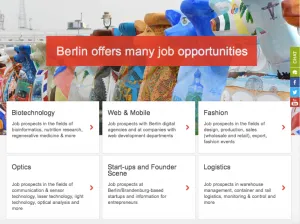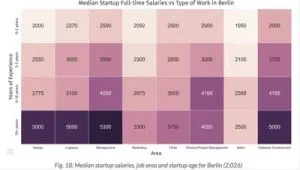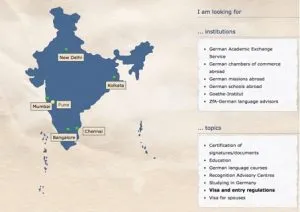Jobs and freelancing - getting started in Berlin
Berlin has a vibrant community of entrepreneurs from across the world. According to Startup Monitor, in 2016 every third employee in a German startup has been from abroad. Setting up a new business or finding a job, however, is not as easy...
If you are looking for a job
As an expert from India, you need a special work permit to get a job in a German company. You might come to Germany to check out the place, but you will have to apply for a visa, including the working permit at the visa offices of the Embassy or the Consulates General in your home country before entering Germany.
Without a concrete job offer, the process could take a few months and is complex. Like many other countries, Germany also defined the professions that are most suffering from a lack of experts. These professions will be favoured in the visa process since in all likelihood an expert will find a job soon. If you entered Germany with a visa granting you the right to take up work, you can start your job immediately. But please do not forget to contact Ausländerbehörde (Foreigners' Office) since you have to apply for a residence permit after you start the job!

If you want to enter with a job in hand, you have to do your research beforehand. Applying from abroad can be successful. Important online sources to find vacant jobs are: Berlin Startup Jobs on Facebook, the official platform Talent Berlin as well as the job databases on media platforms such as Dataconomy. Since developers, tech experts and also other specialists are hot commodities in the German startup ecosystem, many growing startups have also developed concrete services for international job seekers. Organisations like company builders Hitfox and Rocket Internet or the fashion company Zalando have a special relocation service and are recruiting successfully worldwide.

Keep in mind that the average annual gross salary in Berlin is approximately 15 percent below other regionals. Skilled workers and executives in Berlin might earn 43,353 euros on an average. This could also prove an issue in applying for the so called Blue Card for skilled workers, that are available for highly qualified foreign nationals. These EU Blue Cards are issued for a period of four years if you have an employment contract that is guaranteeing a minimum annual gross salary of 50,800 euros or in selected occupations 39,624 euros per annum…. So keep this in mind while negotiating salaries!
Our tips:
- Invest in a trip to Germany or Europe! Use events such as Startup Safari, StartupNight or even WebSummit to meet German entrepreneurs in person, build first contacts and also to check out which of the growing startup communities in Germany is right for you. Maybe startups in Munich, Cologne or Hamburg are looking exactly for you!
- The Berlin startup Club Globals developed a special Facebook bot to answer all your questions. Check it out!
- Many established accelerator programmes are hiring Entrepreneurs in Residence from across the world. In Berlin the Foreign Office in collaboration with the economic development agency Berlin-Partner has developed a fast track option for foreign visa seekers that are engaged in these programmes. It could be a great first step to enter the German startup job market.
If you want to start as a consultant or freelancer
There are two ways to start out as an entrepreneur. The German law differentiates between two types of business people:
A so-called “Gewerbe” applies to “every kind of self-employed activity that allows you to earn money. For instance, traders, caterers, craftspeople or producers of goods are business people.”
On the other side, there are so called liberal professions (“Freie Berufe”). People working in these fields can apply for a “residence permit to exercise an independent activity”. Liberal professions include, healthcare professionals such as doctors, dentists, vets, non-medical practitioners, physiotherapists; legal, tax and business advisory professionals such as attorneys, patent attorneys, notaries, accountants, tax consultants or business consultants; scientific and technical professionals such as surveyors, engineers, IT experts, architects; or linguistic and information-transmitting professionals such as journalists, image-based reporters, interpreters or translators.

This permit is only granted if you can prove that you can finance your endeavour (with a business plan and some references) or have any other income.What you do counts and not just the profession you entered the country with. So if you came from manufacturing but work as a business consultant in Germany, you can qualify as a “liberal professional”. The business service at your local Embassy or a local Tax Office can advice you whether your desired role could be classified as a liberal profession.
Our tips:
- Since every situation is different for every individual, I highly recommend to reach out to the local consulate, embassy or a business organisation that has ties in both countries.
Further sources of information and contacts
- Germany Trade in Invest - GTAI is the economic development agency of the complete Federal Republic of Germany. They have more than 10 offices worldwide, including Mumbai.
- Berlin Partner for Business and Technology - Berlin Partner – is the economic development agency of the Federal State Berlin. With its special startup and entrepreneur services, Berlin Partner is a central point of contact for international experts and companies that have decided to relocate to Berlin.
- German Startup Association - BVSD - The German Startups Association was founded in 2012 and is the central representative of startups in Germany. It has 12 focus groups on selected growth sectors. Unfortunately, most of the content is only available in German.
- Facebook is your friend - Check out the Berlin Freelancers Group and join the group Freelance Friday. You can connect with freelancers and like-minded expats easily.







